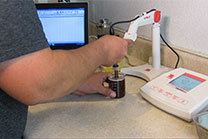One night, John Rubbo and Nick Califano had a beer together-- and a lot of questions. How could they take the feelings of nostalgia and intimacy they so warmly recalled from their childhood of making homemade wine with their grandfathers, and make it something big enough to share? And where could they do it?

As it turned out, the answer to all of their questions was (quite literally) in their own backyard. The two friends decided that nothing was better than a cold brew with good friends; so they decided to focus on brewing craft beer in their hometown. John says, "When Nick and I decided we wanted to open Yonkers Brewing Company and have a presence in Yonkers, we decided that the waterfront was really the only place we wanted to open. We have 4 ½ miles of the Hudson River right down here on the west side of Yonkers, gorgeous buildings, great restaurants...and we wanted to be a part of the all the history down here on the waterfront."
From this, Yonkers Brewing Co was born; a craft brewery and gastropub located in their beloved hometown of Yonkers, New York. In an effort to share the sense of belonging they so warmly recalled, they inserted themselves into the local culture by offering a wide range of activities and events.
Nick and John knew they were sitting on a goldmine, but there was one obvious puzzle piece that needed to be perfected- the beer! With the help of Head Brewer Sharif Taleb, Yonkers Brewing was able to formulate, replicate, and improve all of their brews, eventually adding even more to their roster. "The cool thing about the brewery," says Nick, "is we always have 12 beers on tap. We have 5 flagship brews, and the others are always rotating. It's really up to Sharif, what he wants to experiment with. Since January, we've actually brewed over 25 different styles."

That's where OHAUS came in. With the help of our Starter Series line of water analysis and pH meters, Yonkers Brewing was able to improve their day-to-day workflow and ensure taste consistency across the board. Testing pH has allowed Yonkers Brewing to expand and improve, from a couple of brews all the way to a comprehensive palette of over 20 varieties. Sharif attests to this, saying "One of the things that's been really nice about these meters is all the features, such as the probe calibration, letting us know that our readings are consistent from day to day. That has definitely been one of the best aspects of the tools."
In the Yonkers Brewing laboratory, pH is measured in most stages of production. The process starts with "mash": malted barley that has been steeped in water and heated to almost boiling temperatures. The sweet liquid that is produced is called wort. The wort is transferred to a large tank, where it's boiled and hops are added. The hopped wort is then cooled; during this time, the pH is monitored closely, to ensure that the starch conversion is proceeding according to plan. Once the wort has cooled, it travels to the fermenting tank. The yeast is added and begins eating the sugars, while releasing carbon dioxide and alcohol. This process takes anywhere from 7-14 days, and pH is tested daily to make sure that the fermenting process is moving along correctly. As fermenting progresses, the pH levels drop; once they begin rebounding, the process is complete. Once that happens, the beer is moved into conditioning tanks, where it will be clarified for about a week. In this tank, the temperature will crash to almost freezing, pulling out any remaining particles. After that, the beer is ready to be carbonated and kegged; and, more importantly, enjoyed!
In the brewing process, pH makes an enormous impact on the finished product. "Accuracy is the name of the game in the brewery," according to Sharif. "We're measuring down to hundredths, and our pH drops during the brewing process are very incremental. Having a high measure of resolution really helps us make sure that we're getting accurate readings, and we know exactly where we are with the beer." pH is most critical in the three key stages of brewing life: mash, fermentation, and clarification. During the mash process, starch converting enzymes are present, all with slightly different optimal pH levels. The target level is 5.3, the "sweet spot" for each enzyme. Without being able to accurately gauge how the starch conversion is progressing, the mash process becomes not only inefficient, but expensive. Any inefficiencies during this stage will result in increased ingredient use, which of course leads to increased ingredient costs.

The fermentation process is where pH can really hurt, though. Without pH testing, there's no true way to know when the fermenting is complete. Premature fermentation means a loss of taste consistency, and it also means the possible addition of unwanted flavor profiles. "One of the biggest problems we can have is off flavors. Like diacetyl, which is a kind of butter popcorn smell, almost- it smells like a can of corn, and that's a flavor that you really don't want to have in a beer," Sharif says, laughingly. Thanks to OHAUS, Yonkers Brewing has been able to simplify and streamline their day-to-day tasks. Of the 3 types of meters (benchtop, portable, and pen), "We use the benchtop meters the most. It's a nice, stable setup that allows us to do our testing…and the handheld meters have been extremely practical for spot checks throughout the brewery."
They've even extended the use of their OHAUS meters, by using them to keep tabs on their cleansing solutions between brews. Keg cleaning solutions are used constantly, and the handheld pH meters give Yonkers Brewing the peace of mind of being able to quickly, easily, and accurately check that their cleaning solutions are still operating at maximum effectiveness. As Sharif says, "The use of the OHAUS meters has been great in the brewery. The ease of use and how quickly we can get our processes taken care of really helps us move. We've got a lot of tasks going on, on a day-to-day basis, and making sure that we've got reliable equipment has really helped our consistency."
Having a simple, efficient way to ensure the perfect brew, every time? That's Ingeniously Practical, and we'll toast to that!
Learn More about the
Starter Series